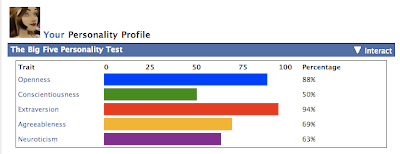 Trait Explanations
Trait ExplanationsOpenness
You are much more intellectually curious and sensitive to beauty than most. Your beliefs tend to be individualistic and frequently drift towards the unconventional. You enjoy your imagination and the exciting places it takes you!
Conscientiousness
You are random and fun to be around but you can plan and persist when work requires. Depending on the situation, you can make quick decisions or deliberate for longer if necessary.
Extraversion
You are constantly energetic, exuberant and active. You aim to be the centre of attention at social occasions and to assert yourself when in groups. You are someone that says, "Yes!"
Agreeableness
People get along with you easily. You are considerate and friendly, and think that other people are generally honest and decent.
Neuroticism
You tend to be self-conscious. You react emotionally to situations more than most, and can find it hard to control your negative feelings.
My Personality DisorderInteract
Research has linked the five personality traits above to the ten personality disorders in the diagnostic manual used by doctors and psychologists. Based on your personality profile, the closest personality disorder is shown below. Please note: It is extremely unlikely that a personality disorder is actually present, this is just for fun!
You think you have histrionic personality disorder
You need attention! You behave inappropriately provocatively and seductively towards others in order to draw attention to yourself. Your theatrical language makes everything sound a bazillion times more exciting than it really is!
Personality Psychology
About the StatementsThe items are all taken from the
International Personality Item Pool, using the 100 question Big Five personality test which is available in the public domain. The Big Five personality traits (openness, conscientiousness, extraversion, agreeableness, neuroticism) were discovered more than 30 years ago, and have been found to be extremely consistent for people even when the test is retaken years later. Thus, they represent a stable part of what it means to be `you`.
OpennessOpenness to Experience describes a dimension of personality that distinguishes imaginative, creative people from down-to-earth, conventional people. Open people are intellectually curious, appreciative of art, and sensitive to beauty. They tend to be, compared to closed people, more aware of their feelings. They therefore tend to hold unconventional and individualistic beliefs, although their actions may be conforming (see agreeableness). People with low scores on openness to experience tend to have narrow, common interests. They prefer the plain, straightforward, and obvious over the complex, ambiguous, and subtle. They may regard the arts and sciences with suspicion, regarding these endeavors as abstruse or of no practical use. Closed people prefer familiarity over novelty; they are conservative and resistant to change.
ConscientiousnessConscientiousness concerns the way in which we control, regulate, and direct our impulses. Impulses are not inherently bad; occasionally time constraints require a snap decision, and acting on our first impulse can be an effective response. Also, in times of play rather than work, acting spontaneously and impulsively can be fun. Impulsive individuals can be seen by others as colorful, fun-to-be-with, and zany. Conscientiousness includes the factor known as Need for Achievement (NAch).
The benefits of high conscientiousness are obvious. Conscientious individuals avoid trouble and achieve high levels of success through purposeful planning and persistence. They are also positively regarded by others as intelligent and reliable. On the negative side, they can be compulsive perfectionists and workaholics. Furthermore, extremely conscientious individuals might be regarded as stuffy and boring. Unconscientious people may be criticized for their unreliability, lack of ambition, and failure to stay within the lines, but they will experience many short-lived pleasures and they will never be called stuffy (i.e. dull, boring, unimaginative).
ExtraversionExtraversion (also "extroversion") is marked by pronounced engagement with the external world. Extraverts enjoy being with people, are full of energy, and often experience positive emotions. They tend to be enthusiastic, action-oriented individuals who are likely to say "Yes!" or "Let's go!" to opportunities for excitement. In groups they like to talk, assert themselves, and draw attention to themselves.
Introverts lack the exuberance, energy, and activity levels of extraverts. They tend to be quiet, low-key, deliberate, and less dependent on the social world. Their lack of social involvement should not be interpreted as shyness or depression; the introvert simply needs less stimulation than an extravert and more time alone to re-charge their batteries.
AgreeablenessAgreeableness reflects individual differences in concern with cooperation and social harmony. Agreeable individuals value getting along with others. They are therefore considerate, friendly, generous, helpful, and willing to compromise their interests with others`. Agreeable people also have an optimistic view of human nature. They believe people are basically honest, decent, and trustworthy.
Disagreeable individuals place self-interest above getting along with others. They are generally unconcerned with others` well-being, and therefore are unlikely to extend themselves for other people. Sometimes their skepticism about others` motives causes them to be suspicious, unfriendly, and uncooperative.
Agreeableness is obviously advantageous for attaining and maintaining popularity. Agreeable people are better liked than disagreeable people. On the other hand, agreeableness is not useful in situations that require tough or absolute objective decisions. Disagreeable people can make excellent scientists, critics, or soldiers.
NeuroticismNeuroticism, also known inversely as Emotional Stability, refers to the tendency to experience negative emotions. Those who score high on Neuroticism may experience primarily one specific negative feeling such as anxiety, anger, or depression, but are likely to experience several of these emotions. People high in Neuroticism are emotionally reactive. They respond emotionally to events that would not affect most people, and their reactions tend to be more intense than normal. They are more likely to interpret ordinary situations as threatening, and minor frustrations as hopelessly difficult. Their negative emotional reactions tend to persist for unusually long periods of time, which means they are often in a bad mood. These problems in emotional regulation can diminish a neurotic`s ability to think clearly, make decisions, and cope effectively with stress.
At the other end of the scale, individuals who score low in Neuroticism are less easily upset and are less emotionally reactive. They tend to be calm, emotionally stable, and free from persistent negative feelings. Freedom from negative feelings does not mean that low scorers experience a lot of positive feelings; frequency of positive emotions is a component of the Extraversion domain.
Explanations of traits are taken from the
Big Five Personality Wikipedia Article










